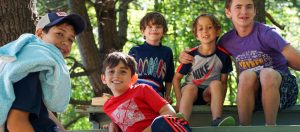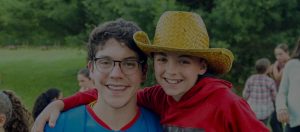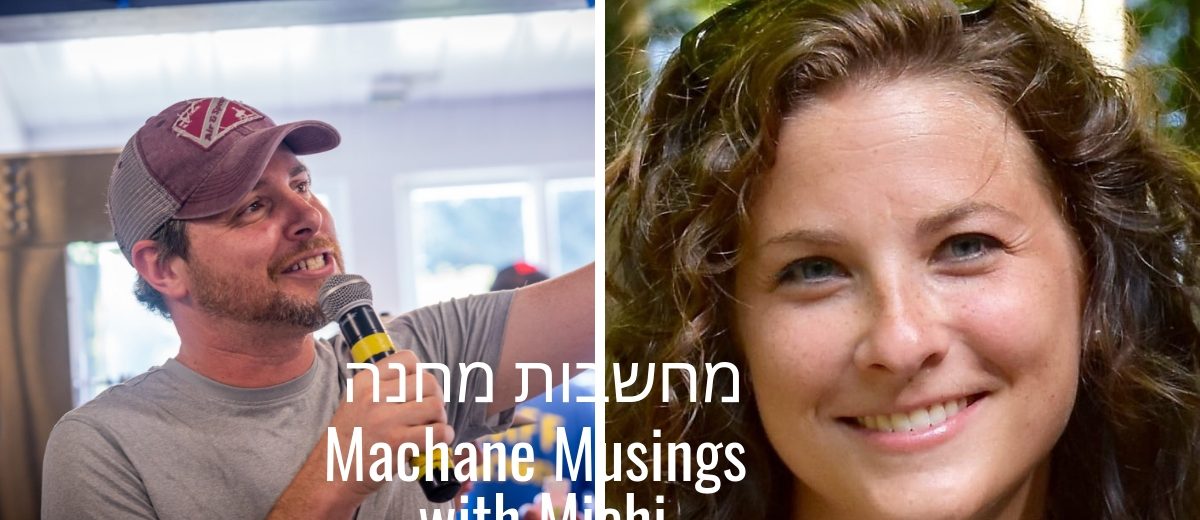By Bil Zarch and Michi Rosenhek Zelermyer
We have been doing a lot of thinking lately about the middot (norms, virtues) of camp. One of the things that has impressed us the most about Yavneh is the sense of community that it strives to create. We see it organically take shape in different ways, both during the summer and all year long, and it is undoubtedly impressive. Due to our K’lal Yisrael mission, kehillah ties are abundant in this place.
Both of us are still relative newcomers to the hanhallah (leadership), but we realize very clearly that as camp leaders, our raison d’être is to inspire others to grab the mantle and run with it. After all, we are building partnerships between campers and staff and leadership, nurturing our children and young adults as they chart their own Jewish destinies and venture outside the comforts of Northwood.
In December 2018, at the Camp Educators Cohort conference through M²: The Institute For Experiential Jewish Education, we spent four days together intensively grappling with how camp’s values translate to those who “walk through our doors” and the experiences that Yavneh is made of. We were each asked to pick a different value that we wanted to educate ourselves and explore in depth before the summer. Michi chose סובלנות (tolerance) and Bil selected נדיבות (generosity), values that can both be interchangeable and yet stand on their own. We were struck by their similarities: What we quickly realized is that no matter how you word the value in an overarching kind of way – tolerance, generosity, kindness, openness, welcome, community-mindedness, open dialogue, acceptance – we had wanted to focus on the same ideas of inclusion, sharing, and welcome, for everyone to find in camp and create a place/community where all can feel at home.
We then “thickened” our understanding of these big value-ideas, defining them through text study, story-telling, different contexts and historical events, cultural influences and beliefs. This subsequently led us to many practical considerations and applications: What is the new camper experience? How do our campers transition into working as counselors? What’s it like to be a new adult specialist/educator acclimating to camp life? How can we help all our constituents feel welcome as valuable contributors to our kehillah? How can we help all those living among us, or visiting during the summer, through the first moments and/or days of feeling disoriented? What are our various roles and how do generosity and tolerance affect us at the level of leadership? What are the best practices in developing our ability to share the inside info and our communal language? How can we be more tolerant of other ideas when we don’t necessarily agree with every detail? What does all this look like? Sound like? Feel like?
During one of our M² sessions, we were genuinely inspired by a very practical teaching in the Talmud: “הוי דן את חבירך לכף זכות” – “Judge your fellow favorably.” (Shuavuot 30a). Rashi’s commentary further explains, that this does not refer to judging litigants in court, rather any person in any circumstance. If you are witness to another person’s actions that could be interpreted as positive or neutral/negative, do not jump to unfavorable judgment. Assume innocence. Share, be open, and take on another’s perspective. How many times do we read in the Torah to be mindful of others, especially newcomers, strangers, and perceived “outsiders”? We try to help our campers cultivate these practices in the bunks and in the chadar ochel (dining hall) and at activities, building “empathy armor”, the idea that we can take on another’s perspective and find kindness to share.
We are already thinking about Kayitz ‘19 with this attitude and mindset: This summer at Yavneh and beyond, we want to be proud of our Yavneh community and give our campers and counselors many opportunities to judge favourably, remain open-minded, stay curious and inquisitive, and be helpful and welcoming to newcomers. We want all our constituents – chanichim, madrichim, morim, roshes, hanhallah, visiting prospective families, visiting scholars, alumni – to feel enfolded by the warmth and openness that characterizes who we want to be as a kehillah. We want this to be the Yavneh-ruach every person encounters on each of their Yavneh arrivals or stays.
Within Judaism’s long history, we are continually reminded to question, debate, grapple, and re-envision. Rabbis and kehillah leaders have always wondered how to stay true to Jewish life and ancestral values, while modernizing, reaching out and being relevant to their current communities. We are all partners in this work of questioning and debate, soul-searching and examination of goals and values. While we won’t all draw the same conclusions, we are chugging along together, creating a future vision of Yavneh’s powerful Jewish moments, grown from the strengths of the past and becoming the building blocks for the youngsters and not-so-youngsters of our community.
Many of our bunks at Yavneh have a question box, often used by campers and counselors to problem solve. We have created our own virtual question box and we want to hear your ideas on how we can continue to foster a culture of generosity, inclusion, perspective-taking, and sharing. What are some implications you think of when you consider welcoming old-timers and newcomers alike, with generosity of spirit and tolerance? Click on the link and tell us how you feel we can further develop our kehillah. These suggestions will be our inspiration as we continue to “thicken” our understanding of these values, together creating a shared language and culture, and ensuring they take hold at Yavneh! We will define and implement these values together, because as Kohelet (Ecclesiastes) states,
טוֹבִ֥ים הַשְּׁנַ֖יִם מִן־הָֽאֶחָ֑ד אֲשֶׁ֧ר יֵֽשׁ־לָהֶ֛ם שָׂכָ֥ר ט֖וֹב בַּֽעֲמָלָֽם
כִּ֣י אִם־יִפֹּ֔לוּ הָֽאֶחָ֖ד יָקִ֣ים אֶת־חֲבֵר֑וֹ וְאִ֣יל֗וֹ הָֽאֶחָד֙ שֶׁיִּפֹּ֔ל וְאֵ֥ין שֵׁנִ֖י לַֽהֲקִימֽוֹ:
“Two are better than one because they have a good return for their labor: If either of them falls down, one can help the other up….”
We all know: Two are better than one. And many are way better than two!




